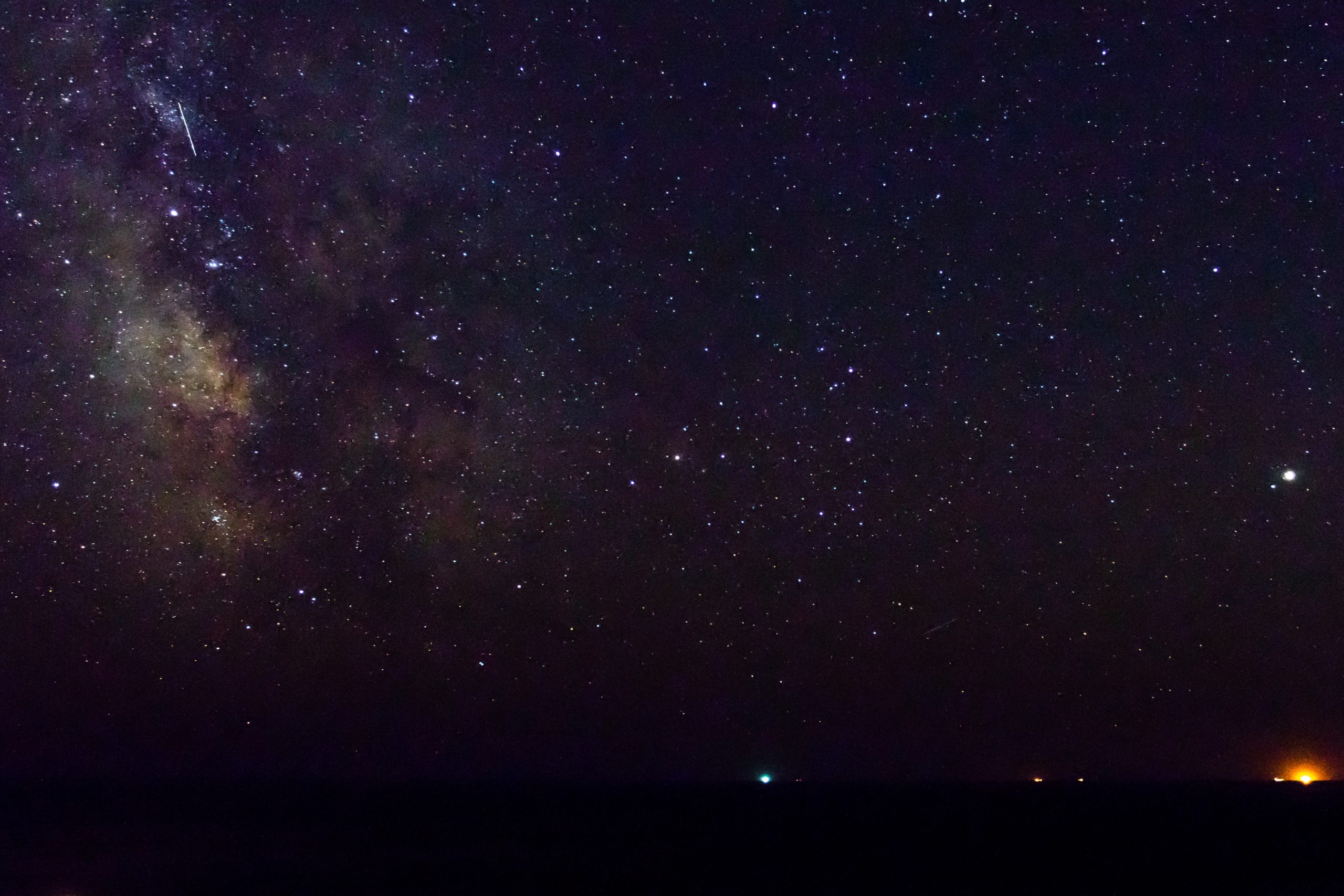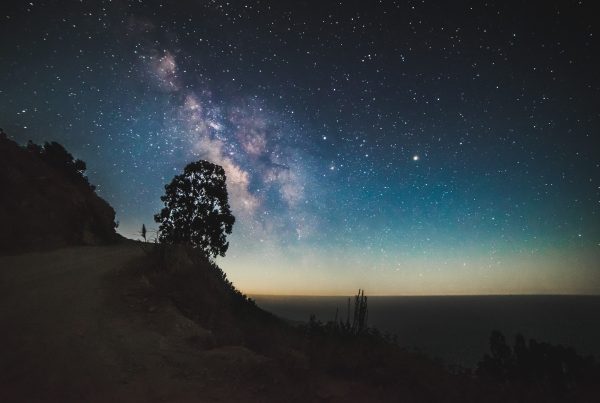My cosmology room has a large transparent skylight and an 8-inch GPS computerized telescope next to the big window. It’s all designed to help me and my family gaze in awe at the heavens. (My grandkids like to use my iPad and iPhone app called “SkyView.” It allows them to point the device around the room—ceiling, walls, or floor—and display the planets, stars, and constellations. It’s a cool app.) Cosmology is the study of the cosmos or nature in its grand scale.
My belief in God is strongly supported by two basic considerations from cosmology: the very existence of the universe and the conditions of the universe that have made human life possible.
God’s revelation in Scripture and in nature speaks about this. “In the beginning God created the heavens and the earth” (Genesis 1:1). The Psalmist says, “The heavens declare the glory of God; the skies proclaim the work of his hands” (Ps. 19:1). In addition, St. Paul asserts that God’s “eternal power and divine nature” can be “clearly seen” through His creation (Romans 1:18-20). To me, cosmology convincingly confirms these claims. I can see these things for myself.
(1) The very existence of the universe is a major point to contemplate. The most basic idea of Scripture is that God was (and is) the ultimate source of the cosmos. Put another way, the universe would not exist without God. How God did it, and how long it took are intriguing questions, but they are secondary to who did it. It’s more important to note that the cosmos ultimately depends on God; it is not self-explanatory. (I know there are many Bible-believers who contend that we must interpret the Bible to say that God’s creation took only 144 hours—six solar days. For now, let me just say that there are other very plausible interpretations of Scripture by many other Bible-believers that allow for the universe and the earth to be extremely old—billions of years old.) The main idea, again, is that the universe ultimately depends on God and is not explanatory.
But without God, what are the logical possibilities? (a) The universe could be eternal and essentially static; (b) the universe could be oscillating in continual expansions and contractions; (c) a single universe could have had a one-time beginning—say, in a “big bang” of some sort; or (d) the universe could be one of an infinite number of universes that continue to pop into existence. The last three possibilities all agree, however, that our physical universe had a beginning at some point in the past—our physical universe is not eternal.
(a) Before the 1920s, most scientists and many others thought that the universe was eternal. However, the observations of Edwin Hubble greatly disturbed that picture. He not only saw other galaxies (for the first time in human history), he saw them moving away from our galaxy at vast velocities. This is what gave rise to the idea that, if the universe is expanding, at one time it must all have been together at the same “point”; it must have been nearly instantly started from some incredibly small spot. That’s the “big bang” idea.
But such an expanding universe was not pleasant news to many. For some notable scientists, a big bang for a universe that was not eternal sounded too much like creation; and that was not acceptable. They tried their best to reject it. Einstein himself did this (though later he referred to it as his “biggest blunder”). It wasn’t until the mid-1960s that an unexpected discovery of “background radiation” throughout the universe propelled the big bang idea toward a general consensus in cosmology. So the notion that the universe is eternal and static is now widely rejected.
One reason this is significant is that the idea of the big bang from science does sound a lot like the basic claim from theology: “In the beginning God created the heavens and the earth.” If the Genesis assertion is true, I would expect to find something like a big bang kind of explanation from science.
(b) Even now, however, other explanations are being offered to try to avoid a God-creation. Some suggest an oscillating universe that eternally expands and contracts. But this isn’t widely held, and it has some major problems. A total lack of evidence is one problem!
(c) and (d) Currently, the most prominent possibility is that a single universe had a one-time beginning, although some notable people are “preaching” the multiverse idea where our universe is just one of a multitude—perhaps even an infinite number—of universes. Stephen Hawking, the famous Cambridge physicist, is touting the multiverse view in his book, The Grand Design (2010). But this proposal goes far beyond pure science. Martin Rees, one of the most reputable cosmologists in the world, says that this view is “highly speculative” and that it “can be no more than a hunch” (Our Cosmic Habitat, p. 164).
Furthermore, without a God, whether it’s the multiverse idea or the notion that a single universe had a one-time beginning, both possibilities eventually lead to the view, as expressed by atheist philosopher Alex Rosenberg, that there was “no reason at all” for our universe coming into existence. It “just springs up … without any cause at all.” If we want something more, Rosenberg says, we should “get over it!” (See Rosenberg, The Atheist’s Guide to Reality, Kindle location 38-39, emphasis added.) Hawking himself claims that a “whole universe” can “just appear out of nothing”—that “the universe can and will create itself from nothing” (The Grand Design, p. 180).
To me, both possibilities not only go far beyond the realm of science, they seem to violate fundamental principles of both science and philosophy. Especially given all the considerations for Christian belief presented in the other rooms in my house, the beginning of the universe carries a lot of weight for me. I don’t find “it just happened” and “it happened with no cause whatsoever” very convincing. If that’s the alternative to God, I think God is pretty safe—at least in my book.
(2) The conditions of the universe offer a second major support for my Christian belief in this room. It’s not just that the conditions of the present universe are “just right” for human life (for example, our “Goldilocks” position in the galaxy and our solar system); it’s that the initial conditions of the universe at its formation needed to be incredibly “just right” in order for our present livable conditions to be as they are.
For instance, there needed to be an amazing level of precision between the rate of the universe’s expansion and the gravitational strength of the total amount of mass (that kept it from literally flying apart). Many scientists have been stunned by dozens of such considerations. How do we explain the main physical constants and the ratios between them? Science, as science, has no good answer.
Such considerations actually led one of the world’s most famous atheists of the 20th century, Antony Flew, to reject his atheism and accept the existence of a cosmic intelligence. He said it this way: “I now believe that the universe was brought into existence by an infinite Intelligence. I believe that this universe’s intricate laws manifest what scientists have called the Mind of God.” (I have the quote framed on the East wall of this room, but if you want see it after our house tour, check out Flew’s There is a God: How the World’s Most Notorious Atheist Changed His Mind, p. 88.)
There is still a lot of mystery here in my cosmology room. But what I do understand in this room points in powerful ways to the existence of a creator who had me (and us) in mind. I should emphasize, however, that I don’t accept God’s existence to fill some “gap” in our current scientific understanding of things. It is our current scientific understanding of things that directs me to God.
Go to the Tour Welcome and the List of Rooms.
Go to the Next Room, my Biology Room.






3 Comments